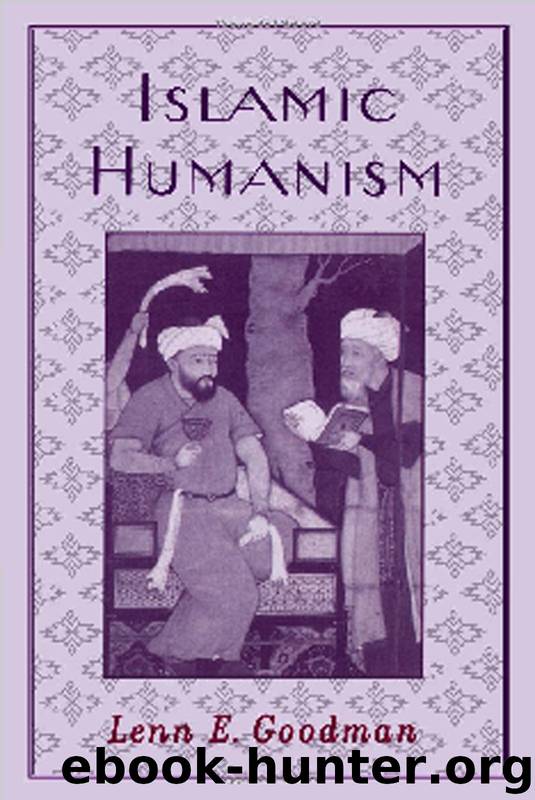Islamic Humanism by Goodman Lenn E.;

Author:Goodman, Lenn E.;
Language: eng
Format: epub
Publisher: Oxford University Press USA - OSO
Published: 2003-08-19T16:00:00+00:00
Knowledge as a Value
The watershed that Islam sets between itself and the prior condition of humanity, especially in Arabia, is marked by the stark Qurānic contrast of knowledge from ignorance. The word for knowledge and its cognates of the root -l-m occur 750 times in the Qurān, as Rosenthal notes. The centrality of understanding is voiced in many more passages, calling on Muhammad’s hearers to think and ponder, consider and understand.43 Cognitive themes are made concrete in many more references to God’s book and pen, parchment and ink.44 They are opened up spiritually by references to light, as in the famous Light verse, cited in this book’s introduction. All the same, the content of the knowledge called for on the human side is usually pretty uniform: The bounties of nature and comforts of culture, the events of history and verses of God’s book are all portents of God’s sovereignty, summoning mankind to repentance and obedience, fealty and faith (e.g. 2:164, 12:111, 31:26-27, 52:1-3, 68:1).
Repeatedly the Qurān blames ignorance for sin. But this ignorance does not exonerate. In the face of perennial prophetic warnings, it becomes culpable, bearing grave consequences in this life and graver still in the hereafter. The Jāhiliyya was, literally, the Age of Ignorance, but in the sense of barbarism and confusion, steeped in anxiety and self seeking (see Qurān 3:154). It was ignorance that led the pagans to flaunt their finery (33:33) and that still leads men to cavil at God’s dominion, as if preferring some archaic, heathen rule by which to be judged (5:50). “The unbelievers,” we read, at a critical juncture in Muammad’s career, “got up heat in their hearts, the heat of Ignorance” (Qurān 48:26).45 That ignorance is not mere lack of knowledge but a positive passion. As in biblical usage, the heart is the vessel of understanding, and Muhammad appeals sixteen times in the Qurān to the insight of hearers with hearts (e.g., 13:19–22). Faith imparts knowledge, for faith is trust, and trust in God gives certitude.
Hundreds of times the Qurān equates knowledge with belief in God and acceptance of the prophetic message. Hundreds of times more the Prophet’s hearers are reminded that God knows what we do not, all that is in land or sea, heaven and earth, the actions and intentions of every man. Knowledge shows us the links between God’s act of creation and His constant governance. And that in turn teaches us to expect the denouement of judgment. So knowledge is a gift of grace. For it is only through knowledge that man is lifted up, not above the beasts but above the damned.46 The salvific coloration imparted here to the idea of knowledge never leaves it in Arabic usage.
From the beginnings of recorded thought in Arabic, knowledge is practical. It does not exclude theory but is never confined to it. And it is valued. Surveying the poetry of the Jāhiliyya, Rosenthal finds a celebration of knowledge, not ignorance. “Is ignorance any match for knowledge?” one pre-Islamic poet asks rhetorically.
Download
This site does not store any files on its server. We only index and link to content provided by other sites. Please contact the content providers to delete copyright contents if any and email us, we'll remove relevant links or contents immediately.
The History of Jihad: From Muhammad to ISIS by Spencer Robert(2628)
Nine Parts of Desire by Geraldine Brooks(2368)
The Turkish Psychedelic Explosion by Daniel Spicer(2356)
The First Muslim The Story of Muhammad by Lesley Hazleton(2271)
The Essential Rumi by Coleman Barks(2046)
1453 by Roger Crowley(2030)
The Last Mughal by William Dalrymple(1857)
Trickster Travels: A Sixteenth-Century Muslim Between Worlds by Davis Natalie Zemon(1847)
Muhammad: His Life Based on the Earliest Sources by Martin Lings(1646)
God by Aslan Reza(1641)
by Christianity & Islam(1632)
A Concise History of Sunnis and Shi'is by John McHugo(1567)
No God But God by Reza Aslan(1545)
Magic and Divination in Early Islam by Emilie Savage-Smith;(1534)
The Flight of the Intellectuals by Berman Paul(1503)
Nothing to Envy by Barbara Demick(1450)
Art of Betrayal by Gordon Corera(1430)
What the Qur'an Meant by Garry Wills(1394)
Getting Jesus Right: How Muslims Get Jesus and Islam Wrong by James A Beverley & Craig A Evans(1342)
